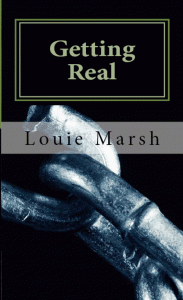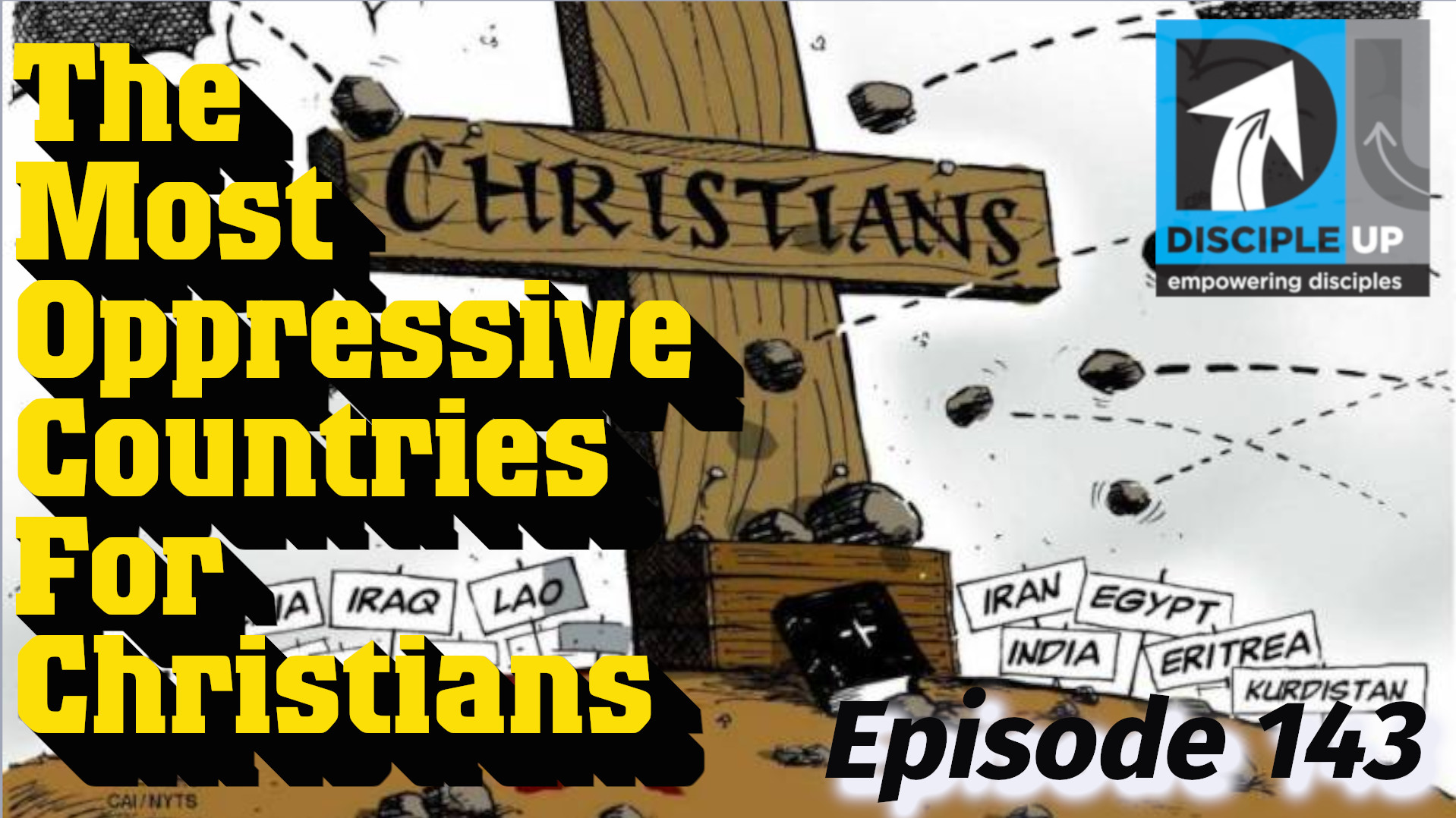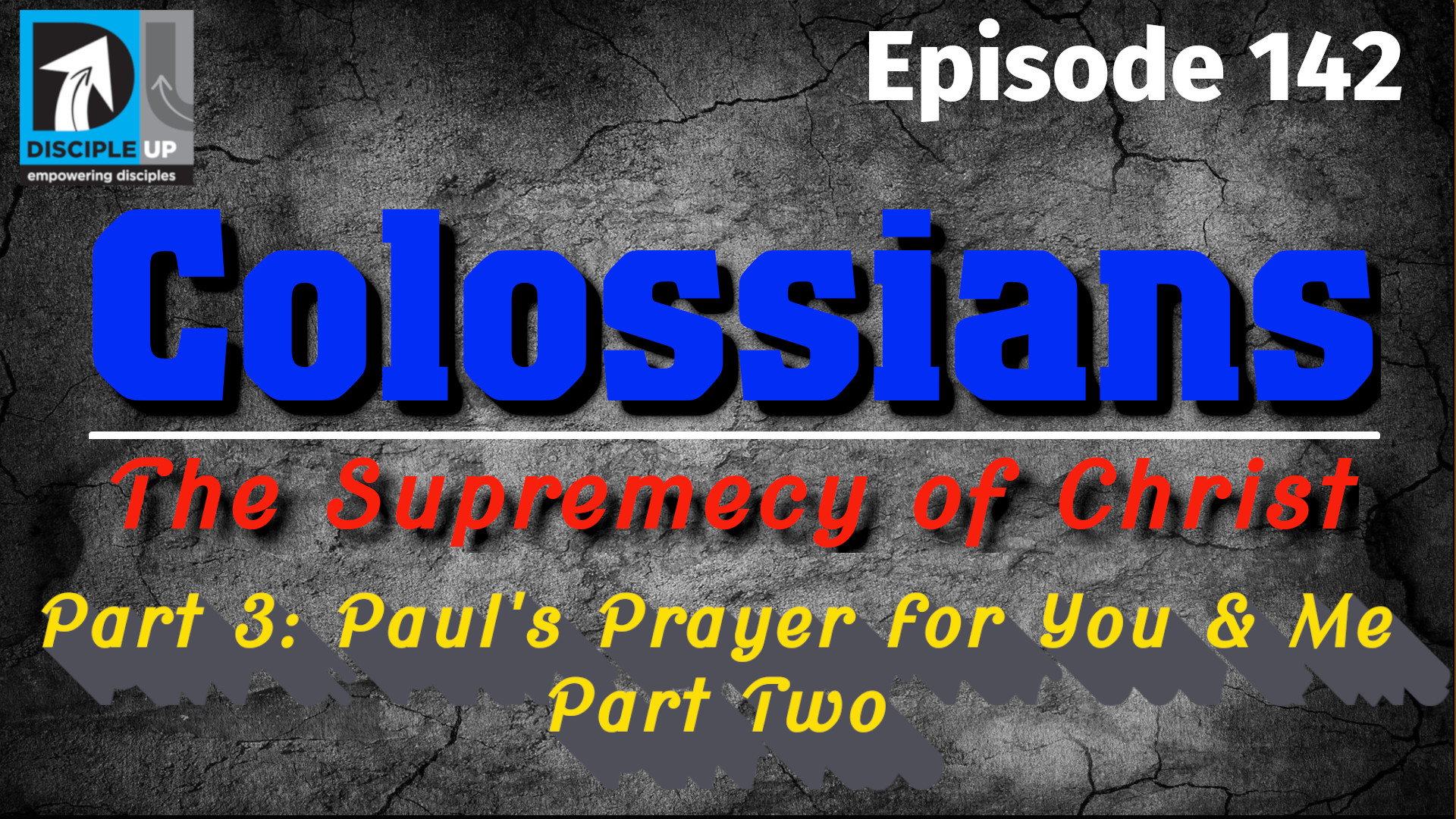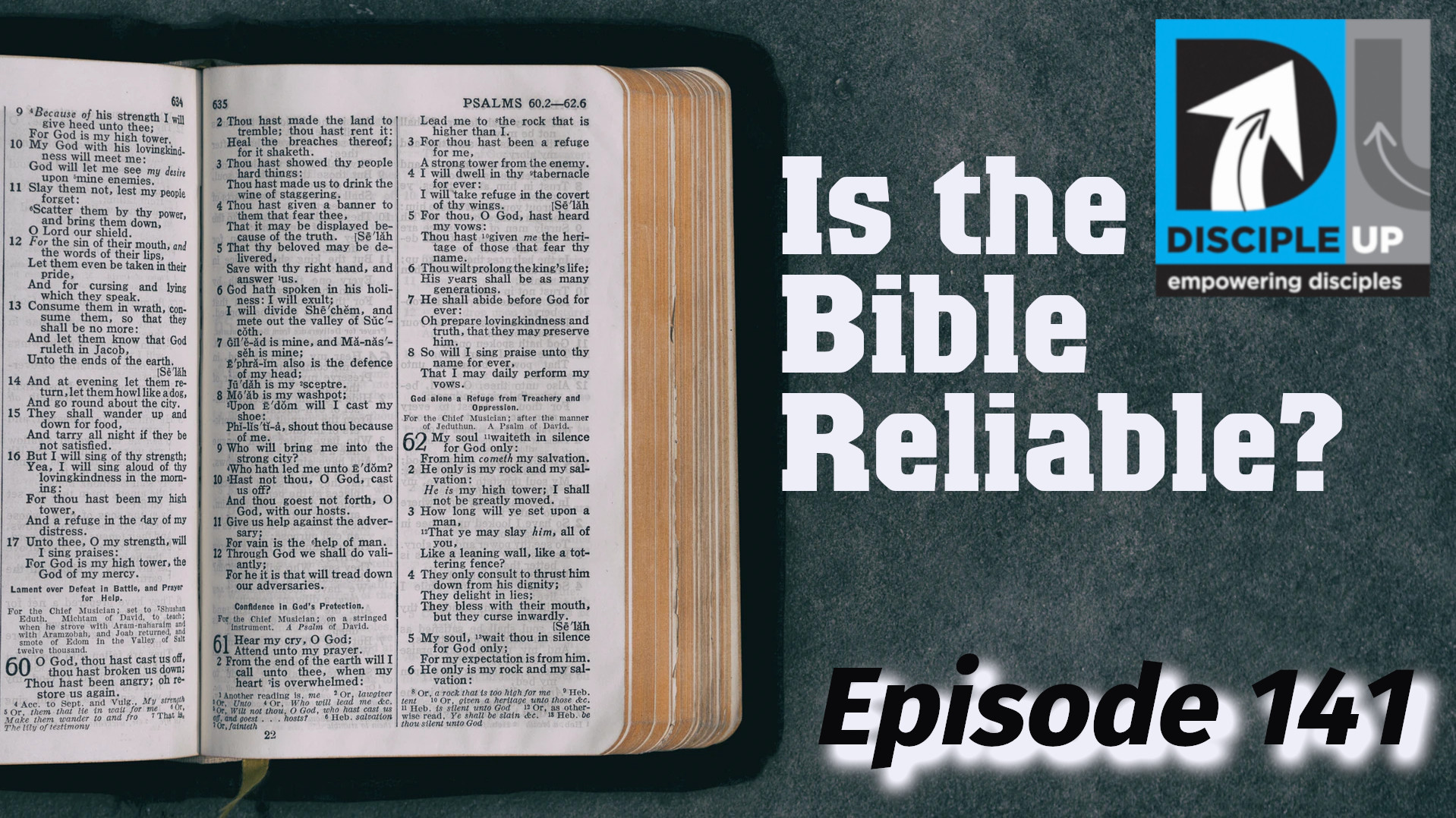Disciple Up # 141
Is the Bible Reliable?
By Louie Marsh
Show Intro – Read E-mail from John Explain this was part of my Basic Bible Questions and this chapter was taken largely from Evidence that Demands a Verdict by Josh McDowell found here: shorturl.at/eoQ68
I have asked this question about the truth of the Bible first for good reason. Everything in Christianity hangs on how this question is answered.
If you say, “Yes, the Bible is true,” then you approach the Scriptures as the very Word of God, accept everything it says as truth revealed by God, and have a standard for truth and morality that transcends time and cultural shifts and quirks. If the Bible is true, then the Christian faith is true also, Jesus is the Son of God and Savior of the world, and everyone should believe and follow Him.
On the other hand, if you say, “No, the Bible isn’t true, it’s simply a collection of writings of men who lived a long time ago,” then you have no eternal standard and are left on your own to decide what’s true and what isn’t. So our faith and the identity of Jesus are left hanging.
The so-called middle ground, that the Bible contains both truth and error, doesn’t really leave you in any better position. Because the end result is that you are the one who decides what’s true and what isn’t. So again we have no standard, and in essence are left to be our own little “gods,” deciding between right and wrong.
The historic Christian position is to accept the Bible as God’s Word, inspired and true in the normal sense of that word. And yes, that is the position I hold.
As will be seen below God has provided us with an overwhelming amount of evidence to support the truth and validity of the Bible. We will only be able to cover a small part of this evidence, but even that should go a long way to answering this question is the Bible Reliable?
What Does the Bible Say About Itself?
All Scripture is inspired by God and is useful to teach us what is true and to make us realize what is wrong in our lives. It straightens us out and teaches us to do what is right. It is God’s way of preparing us in every way, fully equipped for every good thing God wants us to do. 2 Tim. 3:16-17 (NLT)
The Bible makes the astounding claim that it is God message to mankind! The real author of the Bible is God Himself – working through men that He picked! Not only that but Paul makes it clear that it’s not only inspired by God, but practical as well. The Bible tells us that it is God’s Word and is to be used and followed in every area of our lives!
Because of that, we have even greater confidence in the message proclaimed by the prophets. Pay close attention to what they wrote, for their words are like a light shining in a dark place—until the day Christ appears and his brilliant light shines in your hearts. Above all, you must understand that no prophecy in Scripture ever came from the prophets themselves or because they wanted to prophesy. It was the Holy Spirit who moved the prophets to speak from God. 2 Peter 1:19-21 (NLT)
The reason we are told to obey the Bible is that it is God authority for living. Peter says it came about when God moved people to speak or write things down, not when they felt like it themselves. The Bible is like a light directly from God that shows us what to do and how to do it, and what not to do as well.
People sometimes think that this status as God’s Word was something given to the Bible by people who lived long after it was written. But that’s just not true! Look at what Paul and Peter said about their writings:
If anybody thinks he is a prophet or spiritually gifted, let him acknowledge that what I am writing to you is the Lord’s command. 1 Cor. 14:37
Bear in mind that our Lord’s patience means salvation, just as our dear brother Paul also wrote you with the wisdom that God gave him. He writes the same way in all his letters, speaking in them of these matters. His letters contain some things that are hard to understand, which ignorant and unstable people distort, as they do the other Scriptures, to their own destruction. 2 Peter 3:15-16
You can see from the emphasis I placed in the verses that Paul knew God was inspiring him, and that Peter agreed, placing Paul’s writings in the same class as the writings of Moses or David!
It’s clear from these few Scriptures that we’ve studied (and there are more we don’t have time for now) that the Bible claims for itself a unique status – God’s Message to Mankind!
But is there any evidence to back this up? Are we being asked to believe the Bible is true just because it says so? Or is there credible evidence to support this amazing claim?
How do we know the Bible is true?
1) Through it’s Uniqueness.
- The Bible is unique in its continuity. It was written over 1500 year span (that’s more than 40 generations), by over 40 different authors. These men came from every walk of life, including Kings, peasants, philosophers, fishermen, poets, scholars, etc.
- The Bible is Unique in its Languages. The Bible was written on three different continents (Asia, Africa, Europe) in three different languages.
- Hebrew, was the language of the Old Testament. In 2 Kings 18:26-28 its called “the language of Judah.”
- Aramaic, was the “common language” of the Near East until the time of Alexander the Great (6th century BC).
- Greek, the language of the New Testament, it was the international language of the Roman Empire during the time of Christ.
- The Bible is Unique in its translations. As far is known today, the Bible was the first book to be translated into another language. The Greek translation of the Old Testament was made in c. 250 B.C. The Bible has been translated, retranslated and paraphrased more than any other book in existence. By 1977 the number of translations stood at 1603.
- The Bible is Unique in its survival. It has survived through time better than any other book in history. The Bible is one of the oldest books in the world, yet more copies of the Bible exist than any book its age.
- It’s also Unique in its survival through Persecution. The Bible has withstood more attempts to destroy it than any other book every written. Here’s just a few examples…
In 303 A.D. Diocletian issued an edict to destroy Christians and the Bible. Twenty-five years later Constantine commissioned Eusebius to prepare 50 copies of the Bible at the expense of the Roman Empire.
Voltaire, noted Frenchman, said before his death in 1778 that in 100 years Christianity would be extinct. Fifty years after he died the Geneva Bible Society was using his printing press to publish Bibles!
- The Bible is Unique in its survival of Criticism. For more than 1800 years critics have been attempting to destroy the trustworthiness of the Bible. They have made about as much headway as a man armed with a tack hammer facing the Pyramids of Egypt would (John W. Lea, paraphrased). Bernard Ramm says, “A thousand times over the death knell of the Bible has been sounded, the funeral procession formed, the inscription cut on the tombstone, and the committal read, but somehow the corpse never stays put!”
- The Bible is Unique in its Teachings. No other book in history presents truth like the Bible does. Below are just three of the many unique ways the Bible teaches truth.
- Prophecy: The Bible contains by far the largest and most detailed predictions ever assembled. They include prophecies about the Messiah, Israel and her neighbors, etc. Not one prophecy in the Bible has ever been proven wrong – and that’s unique too!
- History: Distinguished archaeologist Professor Albright wrote in his book, The Biblical Period, “The Table of Nations in Genesis 10 stands absolutely alone in ancient literature without a remote parallel even among the Greeks…The Table of Nations remains an astonishingly accurate document…(it) shows such remarkable ‘modern’ understanding of the ethnic and linguistic situation in the modern world, in spite of all its complexity, that scholars never fail to be impressed…”
- Personalities: The Bible deals very frankly with the faults of its main characters. Many ask why the Bible reveals the flaws of its hero’s. Well, the Bible has the habit of telling it like it is, it is indeed the Word of Truth.
2) Through Archaeology
The science of Archaeology has greatly assisted Christians in showing the world that the Bible is what it claims to be – the Word of God and absolutely true. This only makes sense since if the Bible does give us an accurate account of God’s dealing with mankind you would expect it to be backed up by historical evidence.
Nelson Glueck, well known Jewish archaeologist wrote, “It may be well stated categorically that no archaeological discovery has ever controverted a biblical reference.” He also wrote about “the almost incredible accurate historical memory of the Bible, and particularly so when it is fortified by archaeological fact.”
Let’s first examine the Old Testament to see how well it’s stood the test of science and time.
At one time critics rejected the Old Testament because it spoke about a mighty tribe called “Hittites.” Since no other reference to Hittites was then extant, the Bible must be wrong. Only it wasn’t. Since the late 1800’s the fact of a huge and powerful Hittite empire in the ancient east (Turkey was its center) has been proven and is now accepted by everyone.
Here’s a short course on what the Bible says about the Hittites:
- Descended from Canaan’s son, Heth. Genesis 10:15
- Called
- Sons of Heth. Genesis 23:3, 20
- Children of Heth. Genesis 23:5
- One of the seven nations of Canaan. Deut. 7:1
- Dwelt in Hebron. Genesis 23:2-3, 19
- Governed by kings. 1 Kings 10:29; 2 Kings 7:6
- Land of, promised to Israel. Genesis 15:20; Exodus 3:8
- Israel commanded to destroy. Deut. 7:1-2, 24
- Part of their land given to Caleb. Joshua 14:13
- Not entirely destroyed by Israel. Judges 3:5
- Made tributary in the reign of Solomon. 1 Kings 9:20-21
Not bad for an imaginary tribe is it?
For years Genesis 14 was considered to be historically unreliable. Yet the archives of Elba, discovered in 1964 contained thousands of clay tablets. One of those tablets lists the five cities mentioned in Genesis 14, and does so in the exact order found in the Bible!
Okay, okay – you might be saying, but what about the New Testament, how reliable is it?
Of all the New Testament writers Luke has often been singled out for a great deal of criticism. This is due to the fact that he wrote the book of Acts which is the only history book in the New Testament.
At one time most scholars agreed that he had completely missed the boat on the events surrounding the birth of Jesus. Critics argued that there had been no census that Quirinius was not the Governor of Syria at that time and that everyone could not have been made to return to their ancestral home.
Once again archaeology comes to our rescue again! Discoveries were made that show the Romans had a regular enrollment of taxpayers and also held a census every 14 years. This practice was begun by Augustus and the first one took place in either 22-23 B.C. or 9-8 B.C. The latter one is the one referred to by Luke.
We also now know that Quirinius was indeed Governor of Syria around 7 B.C. We know this because he name was found on an inscription in Antioch dated to that time period.
A papyrus found in Egypt gives directions on how to conduct the census. It reads, ‘Because of the approaching census it is necessary that all those residing from any cause away from their homes should at once prepare to return to their own governments in order that they may complete the family registration of the enrollment and that the tilled lands may retain those belonging to them.”
Luke gives to Publius the chief man in Malta the title, “The First Man of the Island in Acts 28:7. Inscriptions have been unearthed which give him the title of “First Man.”
Luke used the Greek word Politarchs to denote the civil authorities in Thessalonica (Acts 17:6). Since this title wasn’t found in classical literature Luke was thought to have been wrong. However, some 19 inscriptions have been found that make use of the title. Interestingly enough five of these are in reference to Thessalonica.
The Apostle Paul, writing from Corinth in Romans 16:23 makes mention of the city treasurer Erastus. A pavement was unearthed during the excavations of Corinth in 1929 which read ERASTUS PRO:AED:S:P:STRAVIT (“Erastus, curator of the public buildings, laid this pavement at his own expense”).
https://www.foxnews.com/science/biblical-town-emmaus-may-have-been-found
So what conclusion can we draw from the evidence so far seen? Obviously it speaks loudly that the Bible is a true, historically accurate and trustworthy document. Surely it is worth of our respect, attention and obedience.
Evidence from the Prophets
If you think that Archeology has produced an impressive amount of evidence to support the Bible as God’s Word, wait till you take a look the fulfilled prophecies of the Old Testament. Below is a list of prophecies we know from archeology and history have been fulfilled, with a estimation of the odds against it coming true.
#
|
Scripture Reference
|
Subject
|
Odds Against Fulfillment
|
| 1 |
Ez. 26:3-21 |
Tyre |
1 in 7.5 X 107 |
| 2 |
Hosea 13:16, Micah 1:6 |
Samaria |
1 in 4 X 104 |
| 3 |
Amos 1:8; Jer. 47:5; Zeph. 2:4-7 |
Gaza & Ashkelon |
1 in 1.2 X 104 |
| 4 |
Ez. 25:3-4; Jer. 48:47, 49:6 |
Moab & Ammon |
1 in 103 |
| 5 |
Isa 34:6-15; Jer 49:17-18; Ez 25:13-14, 35:5-7 |
Petra & Edom |
1 in 104 |
| 6 |
Isa 13:19-22, 14:23; Jer. 51:26,43 |
Babylon |
1 in 5 X 109 |
| 7 |
Jer. 31:38-40 |
Jerusalem Enlarged |
1 in 8 X 1010 |
| 8 |
Lev 26:31-33; Ez 36:33-35 |
Palestine |
1 in 2 X 105 |
| 9 |
Josh 6:2-5 |
Jericho |
1 in 2 X 105 |
| 10 |
Ez 44:1-3 |
The Golden Gate |
1 in 103 |
| 11 |
Jer 26:18 |
Zion Plowed |
1 in 103 |
The probability of these 11 prophecies coming true is 1 in 5.76 X 1059. Let’s try to visualize that number. First of all we’ll round it off to 5 X 1059. Then let’s suppose that we had that many silver dollars. How big a pile would that make?
The volume of the sun is 1,000,000 times larger than that of the earth, yet out of 5 X 1059 silver dollars would could make 10 silver balls the size of the sun!
It has been estimated that the whole universe contains about two trillion galaxies and that each galaxy contains about 100 billion stars. From our 5 X 1059 silver dollars we could make all of the stars in these galaxies 2 X 105 times!
Now suppose that we marked one dollar and stirred it into the whole pile before making them into balls the size of the sun. Then suppose that we blind fold someone and told him to go over to each of the balls and pick up the dollar which he thinks is the right one.
What chance would he have of picking the marked silver dollar?
Assuming he could travel 60 mph day and night it would take him 5 years to go once around each star, or 500 billion years for each galaxy! So let’s suppose that this guy is really fast and is able to look over all the dollars contained in the 100 billion stars of a galaxy in one second!
It would still take him 3 X 10 years (that’s 3 billion years!) to cover them all!
It is absurd to think that he would pick the marked coin! It is just as absurd to think that these prophecies were fulfilled by chance! Only an all-powerful and all knowing God could have written a book that is so amazingly accurate.
This is powerful evidence that the Bible is true and is a good reason for you to put your faith in the Bible as God’s Word! [This section was taken from the book, Evidence That Demands a Verdict, Vol. 1, page 318, Written by Josh McDowell.]
Evidence From Ancient Literature
Many people are bothered by the age of the Bible. They wonder how we can know that the Bible we have today is the same as what was originally written? After all how would we know if it had been changed several hundred years ago?
The answer to these questions are found in manuscript comparison.
The number of copies left of any ancient piece of literature is the main way to tell how accurate it is. Even more important than that is the period of time between when it was written and the date of our earliest copy is. The more copies and the shorter the gap between the original copy and the manuscripts we have means the more accurate the manuscript.
Below is a chart comparing the Old and New Testaments to some of the best known ancient literature.
Author
|
Date Written |
Earliest Copy |
Time Span |
# of Copies |
| Homer (Iliad) |
900 BC |
400BC |
500 yrs. |
643 |
| Caesar |
100-44BC |
900 AD |
1000 yrs |
10 |
| Plato |
427-347 BC |
900 AD |
1200 yrs |
7 |
| Tacitus |
100 AD |
1100 AD |
1000 yrs |
20 |
| Pliny the Younger |
63-113 AD |
850 AD |
750 yrs |
7 |
| Thucydides |
460-400 BC |
900 AD |
1300 yrs |
8 |
| Suetonius |
75-160 AD |
950 AD |
800 yrs |
8 |
| Herodotus |
480-425 BC |
900AD |
1300 yrs |
8 |
| Cataullus |
54 BC |
1550 AD |
1600 yrs |
3 |
| Euripides |
480-406 BC |
1100 AD |
1500 yrs |
9 |
| Demosthenes |
383-322 BC |
1100 AD |
1300 yrs |
200 (all from 1 copy) |
| Aristotle |
384-322 BC |
1100 AD |
1400 yrs |
49 (of any 1 work) |
| Aristophanes |
450-385 BC |
900 AD |
1200 yrs |
10 |
| |
| New Testament |
40-11 AD |
125 AD |
25 yrs |
More than 24,000 |
| Old Testament |
1500-350 BC |
200 BC |
??? |
Over 800 |
As you can see we have more copies of the Bible than we do of any other piece of ancient literature. So why is it that only the Bible is attacked as untrustworthy? When was the last time you heard someone say that Caesar or Aristotle didn’t really write the books that have their names? If we are going to be fair we must judge all ancient literature by the same standards. By that standard the Bible stands head and shoulders above the rest as true and trustworthy!
Evidence From the Early Church
If the Bible is indeed true and trustworthy then we would expect to find that it was widely read, used and quoted by the early Christians. Indeed it was!
If every single copy of the New Testament was completely destroyed, we could reconstruct the entire New Testament except for 11 verses! How? Through the writings of the early church leaders, known as the Church Fathers.
The New Testament & the Early Church Fathers
|
| Writer |
Gospels |
Acts |
Paul’s Letters |
General Letters |
Rev. |
Total |
| Justin Martyr |
268 |
10 |
43 |
6 |
3 |
330 |
| Irenaeus |
1038 |
194 |
499 |
23 |
65 |
1819 |
| Clement of Alex. |
1017 |
44 |
1127 |
207 |
11 |
2406 |
| Origen |
9231 |
349 |
7778 |
399 |
165 |
17922 |
| Tertullian |
3822 |
502 |
2609 |
120 |
205 |
7258 |
| Hippolytus |
734 |
42 |
387 |
27 |
188 |
1378 |
| Eusebius |
3258 |
211 |
1592 |
88 |
27 |
5176 |
| |
|
|
|
|
|
|
| Totals |
19368 |
1352 |
14035 |
870 |
664 |
36289 |
This chart leaves little doubt two things:
- The New Testament was recognized quickly to be the Word of God.
- The Bible we have is the same one that the early Christians had.
Conclusion
After reading over this brief look at some of the evidence available the question we started with seems easy to answer now. Is the Bible reliable?
Yes! The evidence is amble and overwhelming – you can trust the Bible as God’s Word!
Yeah But…
YOU ARE NEVER GOING TO ARGUE ANYONE INTO THE KINGDOM OF GOD.
https://Alpha.org
Please Get In Touch!
Email – louie@discipleup.org






Check out the Disciple Up Facebook page:

My books –















